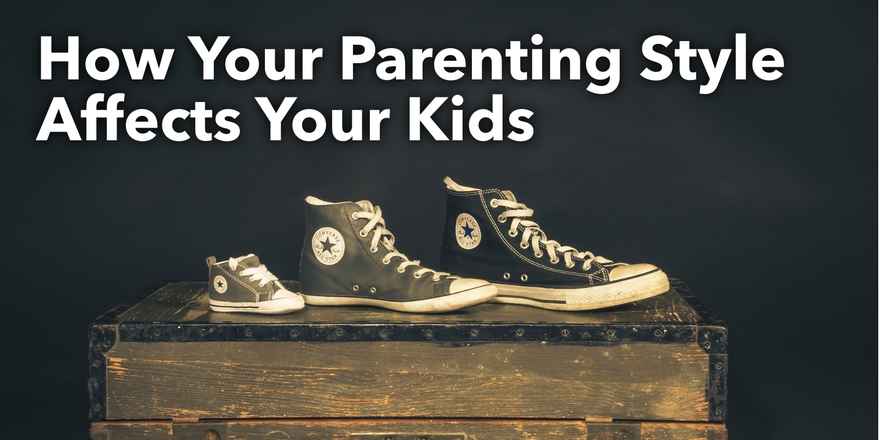How Your Parenting Style Affects Your Kids

Is there a parent alive that hasn’t wondered if they are screwing up their children in one way or another?
As parents, we all do a mental battle with ourselves, “If I am too strict, they won’t feel loved, if I am too lenient, they'll walk all over me.” What to do? What to do?

When it comes to disciplining your tween or teen, the real question is: Are you willing to suffer short-term pain for long-term gain?
In other words, do you give in simply for the peace and convenience of the moment, or do you discipline thoughtfully and consistently with the long-term benefits in mind, regardless of their difficulty or inconvenience? It's not all that different from making a healthy choice about eating, quitting smoking, or exercising. It's so hard, but it is also so worth the work.
It's tough out there.
I feel you. You're trying to raise your kids in permissive parenting, everyone’s a winner, “Just do what makes you happy” society. Even if this doesn't describe your home, your tween or teen is constantly bombarded with this do-what-you-want, question-everything, So-and-so-doesn't-have-to-do-that world. I have two tween girls myself. I know it's not easy. Like my girls, your kids may see consequence-free living in their friends' homes, at school, or on the major “family” networks on TV or streaming services. They have access to more information and influences than any other generation before them. It's a lot to process, and the truth is, they can't. Their brains are still developing and aren't fully capable of filtering all that information to understand it much less implement it through good or rational choices. It's not always defiance, sometimes it's just development. It's normal and massively frustrating.
Consider this: our kids live in one of the most lenient, tolerant, free societies in human history.

Are our children any better off? Is the world getting better? I have yet to see a parent or neighbor on the news, who’s seen a kid do something awful, or say anything other than “He/she was such a nice kid…” Despite our best efforts, we cannot control every choice our kids make. However, we are responsible to try, remaining vigilant, and consistent. Something has to give and I think that something starts at home.
Studies show that our parenting style will have life-long effects on our children. Parenting with a humble heart, I think, is critical. If you as a parent are willing to take an honest inventory of how you can improve, your children only stand to benefit. Personally, my goal is to raise children that willingly serve God first, others second, and themselves last. In doing so, I hope that my children will leave the world a little bit better than they found it.
In the series, “Effective Parenting in a Defective World,” Chip Ingram discusses a fascinating study done on children and their parents. It identified parents as falling into one of four categories, with some variation, of course.
The categories and the effect the parenting style has on their children are as follows:
(1) High in love, low in discipline: “The Permissive Parent”
Children: Have a life-long low self-image and feelings of inferiority.
Reason: No boundaries (via little to no discipline) = no sense of security.
(2) Low in love, low in discipline: “The Neglectful Parent”
Children: Same issues as “permissive parent’s” child only worse + feel unloved, undervalued, neglected, and have low coping skills.
Reason: Parents are unequipped emotionally and/or financially. Parents may be overburdened with their problems to effectively parent.
(3) Low in love, high in discipline: “The Dictator Parent”
Children: provoked to rebellion, prone to fighting/conflict.
Reason: Parents discipline in anger or for absolute control and not in love. Discipline is so rigid, that children can never live up to parents’ expectations so they eventually quit trying.
(4) High in love, high in discipline: “The Authoritative/Fellowshipping Parent”
Children: High self-image, high coping skills, well adjusted, balanced temperament, relationship with parents grow into a friendship in adulthood.
Reason: Consistent discipline from parents is done in love. Defined boundaries create a secure environment for children where love and mutual respect are nurtured. Children thrive in life by learning to obey the rules and respect others.
Of course, you want to be a great parent. (And you are.)

Usually, parents want to be some version of number four, and on some days, you probably are. However, it's important, to be honest with yourself about your weaknesses too. Looking for areas you can improve as a parent is not about beating yourself up. As a parenting expert who works with families and their teens and tweens, it saddens me that so many parents get sucked into that self-defeating loop. It's important to acknowledge where you can improve, but then use that as a launching point to TAKE ACTION. What could you be doing differently? Pick priority #1 and start there.
I beg you not to tackle a giant list all at once. This is overwhelming and sets you up to fail.
Be realistic.
You'd never say "Here, Johnny, go run with these scissors." But have you ever told your kid "I’m only going to say it one more time." when you're going to say it 4 or 5 times? (Or even more, if you're living with a teen. Yikes.) I know I have. This is being too permissive. This is high love, low discipline. You try to be nice and calm, but they don't listen, and then you lose it. The hard truth is that when we say something, we must teach our kids we mean it, the first time. This will serve them later, Lord willing, when we say, "Don't blow off your homework in college". or "Please never get in a car with someone who has been drinking." The key is setting family rules and establishing clear boundaries and consequences, which does't mean constantly threatening to take their phone. Consequences for unacceptable behavior must be made clear beforehand, not in the heat of the moment. Most importantly, you MUST follow through every time.
Have you ever yelled at your kid out of frustration, exhaustion, or anger?

It's hard not to yell sometimes, especially when you're stressed or exhausted. Yelling instead of calmly giving clear instructions or consequences is dictator-style parenting, or low love, high discipline. If your kids get used to a parent that yells, they will first learn to fear you and then learn to ignore you. This is dangerous because your kids may not listen to your advice or seek your help when they need it most. So do a gut check, and think about how you handle discipline. Skip the useless, self-deprecating, "I’m a terrible parent." bologna and get busy making the necessary improvements. Your home and your teen or tween will flourish!
The goal of discipline is to teach respectful obedience, not submission. The goal is to teach your kid to do the right thing for the right reasons. Suffice it to say, obedience through bribery and cajoling do not apply. All this teaches them, especially as they get older, is that rules are optional and open to negotiation. Is it any wonder so many kids have discipline issues at home and school, and then conflict in the workplace or unsuccessful personal relationships later in life?
Discipline is teaching respectful obedience through consistent consequences and actions, with clear instructions, in an atmosphere of love.
Finally, if you need support—and who doesn't—consider joining a parenting group, or working with a professional counselor (like me). I also highly recommend involving your kids in the process by sitting down together and talking about what is and isn't working in your home. Work together to set reasonable expectations, rules, and boundaries, while inviting your kids take ownership over their actions by agreeing ahead of time to the consequences of breaking the rules.
Teaching your kids to respect your authority now equips them to function well with others in the workplace and be attentive, caring, and self-aware in friendships and relationships. Yes, it can suck sometimes. Yes, it can be exhausting and demoralizing. And yes, it is 100% worth the effort.

I'm rooting for you,
Dr. G
Categories
- News (1)
- Healthy Balance (10)
- Motherhood (7)
- Parenting (7)
- Working Mom (4)
- Homeschooling (1)
- Pregnancy (1)
- Health (6)
- Vitamins (1)
- Herbs & Supplements (1)
- Holistic Health (6)
- Body Positivity (1)
- Health and Fitness (1)
- Diet and Health Eating (1)
- Technology (1)
- Tweens & Teens (6)
- Rules & Boundaries (5)
- Lifestyle (7)
- Mental Health (5)
- Writing & Poetry (1)
- AcuPatching (2)
- Acupuncture (1)
- Kid's Health (1)
- Marriage (3)
- Family Life (7)
- Christian Life (6)
- Women's Health (3)
- Girl's Health (3)

0 comments
Leave a comment
Please log in or register to post a comment